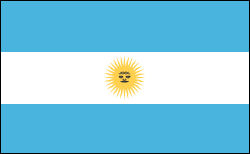Argentina History


The Dirty War Begins
The military began the "dirty war" to restore order and eradicate its opponents. The Argentine Commission for Human Rights, in Geneva, has charged the junta with 2,300 political murders, over 10,000 political arrests, and the disappearance of 20,000 to 30,000 people. The economy remained in chaos. In March 1981, Videla was deposed by Field Marshal Roberto Viola, who in turn was succeeded by Lt. Gen. Leopoldo Galtieri.
On April 2, 1982, Galtieri invaded the British-held Falkland Islands, known as Las Islas Malvinas in Spanish, in what was seen as an attempt to increase his popularity. Great Britain, however, won a decisive victory, and Galtieri resigned in disgrace three days after Argentina's surrender. Maj. Gen. Reynaldo Bignone took over June 14, amid increasing pro-democratic public sentiment. As the 1983 elections approached, inflation hit 900% and Argentina's crippling foreign debt reached unprecedented levels.
In the presidential election of Oct. 1983, Raul Alfonsin, leader of the Radical Civic Union, handed the Peronist Party its first defeat since its founding. Growing unemployment and quadruple-digit inflation, however, led to a Peronist victory in the elections of May 1989. Alfonsin resigned a month later in the wake of riots over high food prices, in favor of the new Peronist president, Carlos Menem. In 1991, Menem promoted economic austerity measures that deregulated businesses and privatized state-owned industries. But beginning in Sept. 1998, eight years into Menem's two-term presidency, Argentina entered its worst recession in a decade. Menem's economic policies, tolerance of corruption, and pardoning of military leaders involved in the dirty war eventually lost him the support of the poor and the working class who had elected him.







